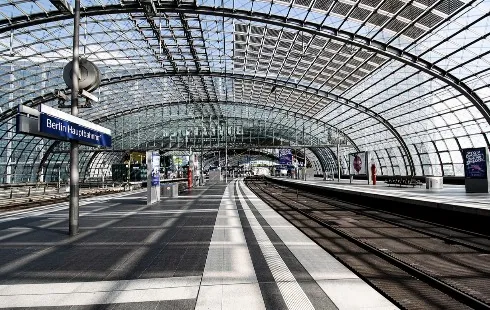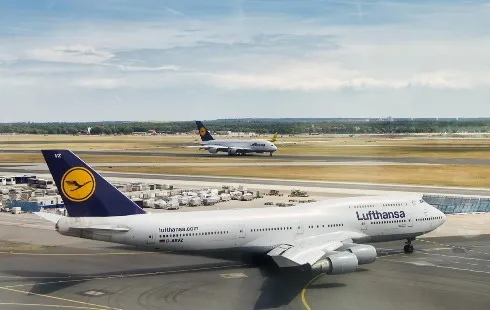
Trump's Tariff War: China Urges Immediate Repeal of Tariffs Amid Countermeasures
Section: News
The Indian voters have spoken. The message is loud and clear, "boldly go Mr. Modi where no Indian prime minister has gone before"! The voters' verdict on 16th May 2014 is clearly what many analysts are calling as a mandate to refashion India in a whole new order. It is a thumping victory for Mr. Narendra Modi's led BJP (Bharatiya Janta Party), something which is unheard, unseen and unexpected in the recent times. A resounding victory gave the BJP 285 seats on its own and the National Democratic Alliance (NDA) of 29 regional parties led by BJP secured 335 seats. No doubt, Mr. Modi has credited the people of India for this clear verdict, but it is his presidential-style campaign which turned conventional psephology on its head as BJP becomes the first non-Congress party in independent India to have secured a clear majority. The previous best performance of BJP was around 183 seats under Mr. Atal Bihari Vajpayee in the 1998 and 1999 elections. The last time when India witnessed a single party majority was some 30 years ago when Mr. Rajiv Gandhi rode on a sympathy wave of Ms. Indira Gandhi's assassination, which gave him a landslide two-thirds majority.
In a way, this election is also a triumph of Indian democracy as it takes the conventional wisdom head-on, that poor, underdeveloped, ethnic and religious fractionalised societies cannot sustain democracy. It took 227 years for the United States to produce a president of an Afro-American origin. Europe is yet to see someone from a minority community holding a top constitutional post. While a poor, underdeveloped, fractionalized India has already produced many Muslim presidents, a Sikh prime minister (all from minority communities) in the past and now it is the turn of Mr. Modi who hails from a backward caste community and is a son of a provincial tea seller.
This election is also significant in many ways. Firstly, for the first time in 30 years India will have a Parliament with no leader of the opposition (as the Indian National Congress failed to secure even 10% of the total Parliament seats in the lower house). Secondly, the performance of the Indian National Congress in this election is the worst since its inception. In fact, the total number of seats the Congress party secured nationally in this election was lower than the number of seats BJP garnered in the state of Uttar Pradesh alone! Thirdly, in seven of the biggest states in India, the Congress party failed to even open its account. It is a decimation of the Congress party of the worst kind. Fourthly, in this election voters broke the shackles of caste, religion, age, gender, class and language to give BJP an unequivocal mandate. A simple 'back of the envelope' calculation reveals that 22 of the 30 constituency seats reserved for the Scheduled Tribes were won by the BJP. A sizable chunk of the 150 million first-time voters within the age group of 18-22 years have overwhelmingly backed Mr. Modi. The impressive performance of BJP extended beyond its traditional bastions of Hindi heartland (North-West and Central India) and urban areas. It made a successful foray into Southern and Eastern India as well as into rural areas. Fifthly, the secularism bogie has also been smashed as a large number of Muslim voters, around 70%, voted prodigiously in favor of Mr. Modi, who epitomized change and the promise for a better future. Finally, Mr. Modi will be the first post independence born prime minister reflecting the desire of a young aspirational India, the post independence generation, bursting with raw energy striking out on its own. And, it will also be the first time that a Chief Minister of a state ascends to power in the center and is expected to last the full five-year term.
The political ramifications of these results too are enormous, and frankly, no one could have envisaged them coming. Within 24 hours of results being declared the Congress Chief Minister of Assam resigned, taking moral responsibility of the party's drubbing in the state where BJP never had a say. Another Congress Chief Minister of India's economically powerful state, Maharashtra, too offered to resign. Pressure is mounting on the Gandhi family (both Mr. Rahul Gandhi and Ms. Sonia Gandhi) to quit from party posts. But, the most interesting and unexpected resignation has come from the Chief Minister of Bihar, Mr. Nitish Kumar, who pulled out of the NDA soon after BJP coroneted Mr. Modi as its Prime Ministerial candidate on the issue of secularism. Mr. Kumar's regional party - the JDU (Janata Dal United) was virtually routed in Bihar. Anticipating a rebellion from the party's rank and file, Mr. Kumar offered his resignation a day after the election results were declared.
What does all this mean for India? Many have already started drawing parallels to China's Deng Xiaoping - the father of Chinese economic liberalization. Armed with a massive victory, many, particularly the business elites, analysts and market participants are asking whether Mr. Modi can do a Deng Xiaoping for India. As an auderent supporter of Mr. Modi, it was quite fascinating for me to see how the discourse has shifted in Indian media. From being abelled the 'hate hero', 'modern day Nero' not too long ago, the Indian media now compares Mr. Modi to Mr. Deng Xiaoping. Quite a remarkable change, I must say. Mr. Modi prevailed over the elite English media!
What is fascinating is that there are lot of similarities between Mr. Modi and Mr. Xiaoping. Both had humble origins and fought their way up in their respective parties. Both had to see through party politics to assert their control in their respective parties. While Mr. Xiaoping was purged by Mr. Mao, pugilist Mr. Modi had to fight party factions to get to the top. Both appear to be strong, disciplined and decisive. Interestingly, both are accused of presiding over grave human rights violations - the Tianmen Square student crackdown in the case of Mr. Xiaoping and Mr. Modi on Hindu-Muslim riots in Gujarat 2002, in which over 2000 people died. While both had to face international criticism, Mr. Modi additionally met intense visceral hate campaign launched by the Congress party, elite English media, and some left-leaning NGO groups. These groups deliberately stoked fears in Muslims against Mr. Modi and the BJP. But what interests many who wish to draw parallels between them is that they both embody development and reforms. While Mr. Xiaoping woke China from a long slumber, Mr. Modi pulled Gujarat from the rut after taking charge in 2001. However, the economic model which they embraced is markedly different from one another.
The popular belief among the masses is that Mr. Modi, like Mr. Xiaoping, stands for pro-market policies, economic reforms and privatization. Despite the massive mandate behind him, I argue that those anticipating big bang reforms like the dramatic opening up of all sectors to the outside world; abolition of the Planning Commission signaling the end of a planned economic model; large scale privatisations; will be thoroughly disappointed. Instead, one can expect Mr. Modi to follow what I call a 'pro-business model', which is in stark contrast to Mr. Xiaoping's 'State-led Capitalism model' and the 'pro-market model' propagated by international financial institutions like the World Bank and IMF. In fact, Dr. Manmohan Singh, the outgoing prime minister, exemplifies the 'pro-market model' as India opened up to the outside world in 1991 under his stewardship when he was the finance minister. Much of the 'Gujarat model', which Mr. Modi ran for the last 12 years as Chief Minister, rests on the premise of a strong 'pro-business model'. For instance, when Mr. Modi took charge in 2001, the state was reeling under a severe power shortage. Pressure mounted on him to privatise the Gujarat State Electricity Board. Mr. Modi resisted calls to privatisation and rather emphasised on restructuring the Electricity Board. Today more than 98% of Gujarat gets uninterrupted electricity. In fact, the turnaround was so swift that Gujarat has become the only power surplus state in India, not only providing uninterrupted power supply within but also selling the surplus to neighboring states.
So, what is the 'pro-business model'? Unlike the pro-market model which has its roots in neoclassical economics, a pro-business model, argues Dr. Atul Kohli, is based on real world experiences. For instance, the East Asian economic miracles (viz., South Korea, Taiwan, and Singapore) show that a pro-business model hinges upon the quality of state intervention. In this model, the state and business sector (traditionally dominated by the domestic private sector) have common goals and are expected to cooperate to take the economy forward. The state's commitment to high economic growth coincides with profit maximisation goals of the domestic private business sector. The prime task of the state, as Mr. Modi delivered quite efficiently in Gujarat, is to ease off the demand and supply constraints faced by the domestic private industry. The state help facilitate capital, labor, much needed infrastructure and technology at cheaper rates (taming direct supply side constraints) and investing in R&D, education, health (addressing indirect supply side constraints). The FDI will be a priority only in sectors where technology transfer is paramount. On the other hand, addressing demand side constraints include running expansionary fiscal and monetary policies to boost domestic demand. This explains the tensions between BJP and Mr. Raghuram Rajan, governor of the Indian central bank. So, the unwritten deal is that the domestic industry fuels industrialisation, job creation and thereby increasing economic growth and in return the state not only commits to creating a conducive business environment (by easing off demand and supply side constraints) but also protects the industry from intense foreign competition. Mr. Modi has successfully adopted this model for the last 12 years in Gujarat and this explains why he is the darling of Indian industry. The end result in Gujarat was a surge in the industrialisation process, uninterrupted double digit economic growth and low unemployment rate. Expect Mr. Modi to replicate the pro-business model when he formally sets the economic agenda in the weeks and months to come.
But irrespective of whatever economic model which Mr. Modi might follow, to match the legacy of Mr. Xiaoping he has to walk the talk. As Mr. Modi made it clear in a speech to newly elected BJP Parliamentarians last week dedicating his government to the poor, he must be aware that China pulled 680 million out of poverty during the 1981-2010 period. This roughly translates into 23 million people coming out of poverty every year. Much of the policy foundations have been laid under the dynamic leadership of Mr. Deng Xiaoping (1981-1992). He not only resisted his party comrades' demand to halt economic liberalisation in the aftermath of the Tianmen Square crackdown, but also ensured the continuity of the economic policies which laid a very strong foundation to take China where it is today. If Mr. Modi has to do a Deng, then he must replicate the same performance in India which the impatient young voters expect from him. As Mr. Deng Xiaoping once famously said, 'it doesn't matter if a cat is black or white, so long as it catches mice', it is not important which economic model Mr. Modi might want to embrace as long as it produces the results for which people have given him this colossal mandate - a mandate for dramatic change.

Section: News

Section: News

Section: Health

Section: News

Section: News

Section: Travel

Section: News

Section: News

Section: Politics

Section: Arts

Health Insurance in Germany is compulsory and sometimes complicated, not to mention expensive. As an expat, you are required to navigate this landscape within weeks of arriving, so check our FAQ on PKV. For our guide on resources and access to agents who can give you a competitive quote, try our PKV Cost comparison tool.

Germany is famous for its medical expertise and extensive number of hospitals and clinics. See this comprehensive directory of hospitals and clinics across the country, complete with links to their websites, addresses, contact info, and specializations/services.

Join us for a captivating organ concert featuring Giacomo Gabusi from Bologna. Experience an evening of classical music with works by Wagner, Bossi, and Messiaen, among others. This event is part of the Pasinger Orgeltage series, promising a delightful musical experience. Admission is free, but...
No comments yet. Be the first to comment!